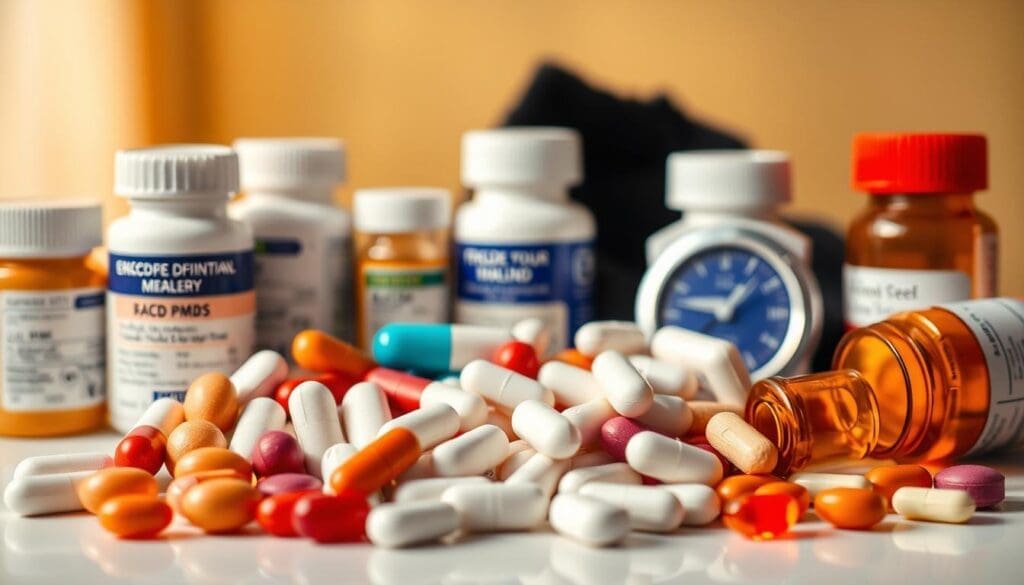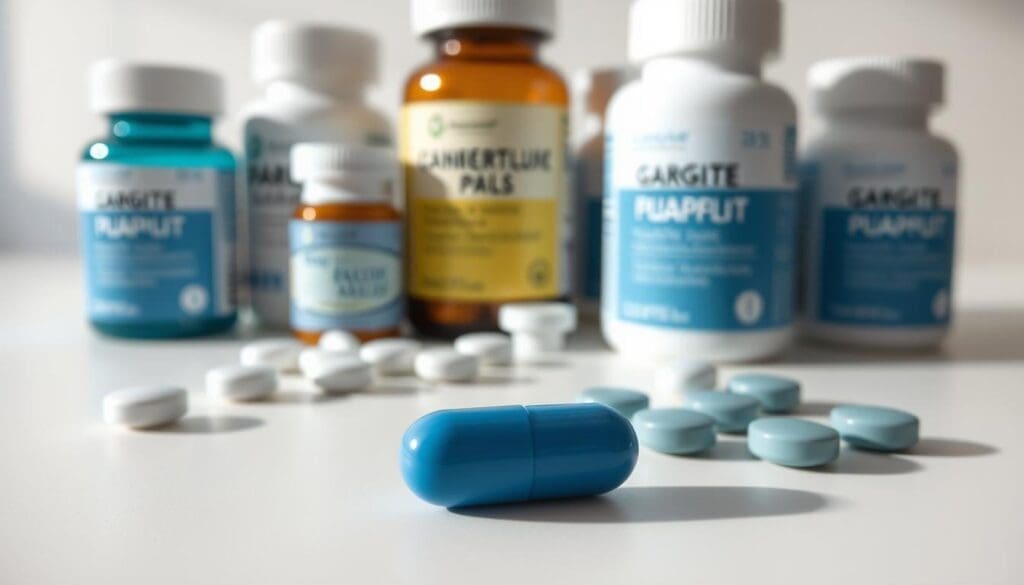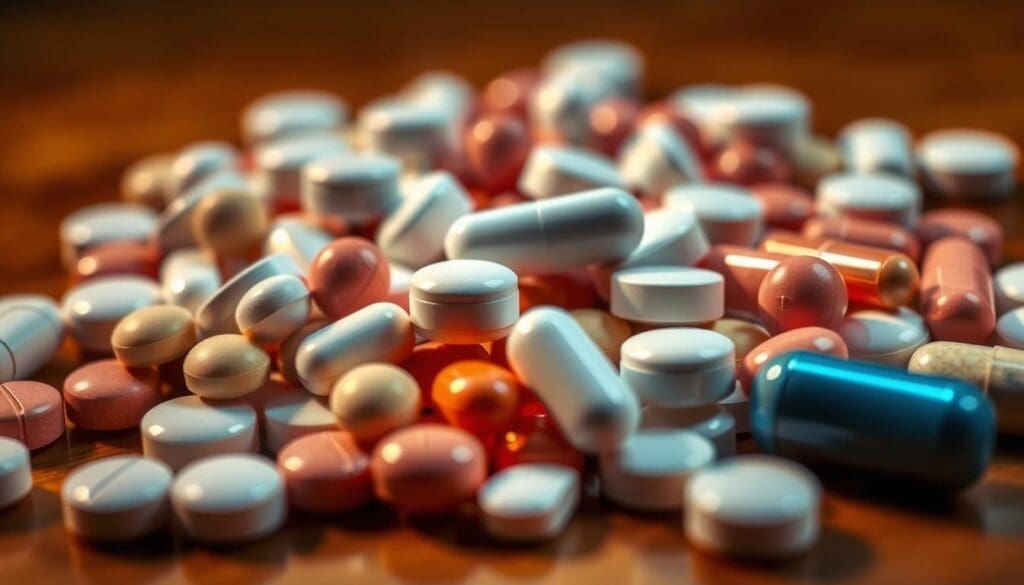
Certain blood pressure medications can cause erectile dysfunction. This is a common issue for many men around the world. At Liv Hospital, we take this seriously. Can blood pressure meds cause ed? Learn about 7 common medications that are known to cause erectile dysfunction and what your alternatives are.
About one in five men with erectile dysfunction blame their meds. Knowing which antihypertensive drugs might cause this helps patients. It lets them work with doctors to find treatments that keep their heart and sex life healthy.
We’ll look into how some blood pressure medications can lead to erectile dysfunction. We’ll also talk about how to handle this side effect.
Key Takeaways
- Certain antihypertensive medications can lead to erectile dysfunction.
- Understanding the risks associated with different blood pressure medications is key.
- Patients can work with healthcare providers to find alternative treatments.
- Managing erectile dysfunction needs a full approach.
- Liv Hospital’s specialists offer top-notch care for international patients.
Understanding the Link Between Blood Pressure Medications and Erectile Dysfunction

It’s important to know how blood pressure meds affect sexual health. These drugs help control high blood pressure but can also impact sex life.
About one in five cases of erectile dysfunction is caused by medication. This shows we need to look into this more.
The Prevalence of Medication-Induced ED
Medication-induced erectile dysfunction is a big issue. Studies show some blood pressure drugs can cause ED as a side effect. The risk varies by drug type.
How Blood Pressure Medications Affect Sexual Function
Blood pressure meds can harm sexual function in different ways. Some drugs might cut down blood flow to the penis. Others can mess with hormones or brain chemicals that control sex.
For example, diuretics and beta-blockers are more likely to cause ED than other blood pressure drugs.
Recognizing ED Symptoms Related to Medication
It’s key to spot ED symptoms linked to meds. Signs include trouble getting or keeping an erection, lower sex drive, and other sex problems.
If you notice these signs, talk to your doctor. They can figure out why and find other treatments.
| Medication Class | Risk of ED | Examples |
| Diuretics | High | Hydrochlorothiazide |
| Beta-Blockers | Moderate to High | Atenolol, Propranolol |
| ACE Inhibitors | Low | Lisinopril, Benazepril |
Can Blood Pressure Meds Cause ED? The Science Explained

The connection between blood pressure meds and erectile dysfunction is complex. It involves changes in blood flow, how blood vessels work, and hormone levels. Knowing this helps patients and doctors make choices that keep blood pressure under control without hurting sex life.
Physiological Mechanisms Behind Medication-Induced ED
Blood pressure meds can mess with erectile function in several ways. Diuretics might cause dehydration, which can cut down blood flow to the penis and lead to ED. But not all diuretics have the same effect. For example, some might be better than others.
It’s not simple to say if all diuretics cause erectile dysfunction. Studies show some diuretics might lead to ED, but how often depends on the type, dose, and the person taking it.
The Role of Vascular Function and Blood Flow
Good blood vessel health is key for erections. Blood pressure meds that mess with blood vessels can hurt erectile health. Beta-blockers, for example, can lower blood flow and heart rate, making it harder to get an erection.
On the other hand, ACE inhibitors might not hurt erectile function as much. They could even help by making blood vessels healthier. The link between ace inhibitors and ed is being studied, showing ACE inhibitors might be safer for sex.
Hormonal Influences of Antihypertensive Drugs
Hormones play a big role in erections. Some blood pressure meds can mess with hormone levels, affecting erections. For example, some meds might lower testosterone or mess with other hormones needed for sex.
Choosing the right blood pressure meds is key to avoid ED. Patients should talk to their doctors about their concerns. This way, they can find the best treatment without losing their sex life.
Figuring out if ace inhibitors can cause ed is part of a bigger picture. It’s about how different meds affect sex. By picking meds that are less likely to cause ED, patients can manage their blood pressure and keep their sex life intact.
Hydrochlorothiazide: A Common Diuretic That Can Cause ED
Hydrochlorothiazide is a common drug for high blood pressure. But, it can also cause erectile dysfunction in some men. This diuretic increases urine production to lower blood pressure. Yet, its effect on erections is a concern for doctors and patients.
How Hydrochlorothiazide Works in the Body
Hydrochlorothiazide helps the kidneys remove more sodium and water. This reduces blood volume and pressure. It’s important for heart health and preventing heart problems. The diuretic effect of hydrochlorothiazide is mainly because it blocks sodium-chloride cotransport in the kidneys.
Mechanism Behind ED Side Effects
The exact reason hydrochlorothiazide causes ED is not clear. But, it’s thought to be due to changes in blood flow and hormones. Less blood flow and hormonal imbalances might contribute to ED in men on hydrochlorothiazide. Also, dehydration from the diuretic effect can worsen ED symptoms.
Prevalence and Risk Factors
Research shows that ED is more common in men on hydrochlorothiazide. Factors that increase the risk include age and other heart disease risk factors. Monitoring and adjusting treatment plans can help reduce these risks.
Spironolactone: Potassium-Sparing Diuretic with ED Concerns
Spironolactone is known for treating high blood pressure. But, it also has effects on sexual health, like erectile dysfunction. It works by keeping potassium levels stable while increasing urine production.
Mechanism of Action
Spironolactone blocks aldosterone receptors. This leads to less sodium being kept in the body and more potassium. It helps lower blood pressure by reducing body fluids. But, it can also affect hormones, which might impact sexual function.
Hormonal Effects Contributing to ED
The hormonal effects of spironolactone are key to understanding its link to erectile dysfunction. It acts as an anti-androgen, which can lower testosterone levels. This might cause sexual side effects.
“The anti-androgenic properties of spironolactone can lead to decreased libido and erectile dysfunction in some patients.”
This is a big concern for men with hormonal imbalances.
Who Is Most at Risk for Sexual Side Effects
Those most at risk for sexual side effects from spironolactone include men with hormonal imbalances. This is true for those with low testosterone levels. Men with a history of sexual problems or taking other medications that affect sex might also be at risk.
Healthcare providers should talk to patients about the possible sexual side effects of spironolactone. This is important for those at risk for erectile dysfunction. By monitoring and adjusting treatment, these risks can be managed.
Beta-Blockers and ED: Atenolol and Propranolol
It’s important to know how beta-blockers affect erectile function. These drugs are key in treating high blood pressure and heart issues. But, they can also impact sexual health, like causing erectile dysfunction (ED).
How Beta-Blockers Affect Blood Pressure
Beta-blockers block the hormone epinephrine, or adrenaline. They slow the heart rate and reduce its workload. This lowers blood pressure, as the heart doesn’t have to pump as hard.
Atenolol and propranolol are two common beta-blockers. They help treat high blood pressure, angina, and heart conditions.
Mechanism of Action: Beta-blockers stop the beta-adrenergic receptors. This reduces the heart rate and contraction force, lowering blood pressure.
Impact on Blood Flow and Testosterone
Beta-blockers can affect blood flow and testosterone levels. Erectile function needs good blood flow to the penis.
Reduced Blood Flow: Beta-blockers might lower blood flow to the penis. This makes it hard to get or keep an erection.
Testosterone Levels: Some studies say beta-blockers might lower testosterone. But, the evidence isn’t clear.
Reported ED Rates with Atenolol
Atenolol, a beta-1 blocker, has been linked to ED in studies. The rate of ED varies, but it’s seen as a side effect.
| Study | ED Incidence with Atenolol |
| Study A | 15% |
| Study B | 20% |
| Study C | 12% |
Propranolol’s Effects on Sexual Function
Propranolol, a non-selective beta-blocker, can also cause sexual side effects like ED. Its wide action might affect erectile function.
When looking at ED risk, consider the person’s health and the beta-blocker type. Changing the medication or finding other treatments might help reduce side effects.
Metoprolol: A Widely Prescribed Beta-Blocker with ED Side Effects
Metoprolol is often given for high blood pressure and might cause erectile dysfunction. It’s a beta-blocker used for heart and blood pressure issues. Doctors often choose it because it works well for high blood pressure.
Use in Hypertension Treatment
Metoprolol blocks certain chemicals in your body that affect your heart and blood vessels. This action lowers your heart rate and blood pressure. It’s effective in treating high blood pressure, making it a common choice.
But, how it lowers blood pressure might affect your ability to get an erection. We’ll look into this more in the next parts.
Vascular Effects Related to ED
Metoprolol’s effects on blood vessels could lead to erectile dysfunction. By lowering blood pressure, it might reduce blood flow to the penis. Erectile dysfunction caused by metoprolol might be due to these vascular changes.
Studies show beta-blockers like metoprolol can harm erectile function. They might reduce blood flow and affect neurotransmitters needed for an erection. Knowing this helps patients and doctors make better choices.
Comparing Metoprolol to Other Beta-Blockers
It’s important to compare metoprolol with other beta-blockers for erectile dysfunction risks. Not all beta-blockers affect sex the same way. Some might have a bigger impact on erectile function than others.
Nebivolol, a newer beta-blocker, might be better for erectile function than metoprolol. It releases nitric oxide, which helps blood flow and might reduce erectile dysfunction risks.
Choosing the right beta-blocker is key to managing high blood pressure without harming erectile function.
Central-Acting Agents: Clonidine and Methyldopa
Clonidine and methyldopa are used to treat high blood pressure. They work by affecting the brain, which can lower blood pressure. But, this can also affect sexual function.
Clonidine’s Unique Mechanism and Sexual Side Effects
Clonidine lowers blood pressure by acting on the brain. It does this by stimulating certain receptors. This can lead to sexual side effects, like erectile dysfunction.
Studies show clonidine can lower libido and cause erectile dysfunction in some patients.
Table: Comparison of Clonidine and Methyldopa
| Medication | Mechanism of Action | Sexual Side Effects |
| Clonidine | Stimulates α2-adrenergic receptors | Erectile dysfunction, decreased libido |
| Methyldopa | Converted to α-methylnorepinephrine, acts on central nervous system | Erectile dysfunction, decreased libido |
Methyldopa’s Impact on Erectile Function
Methyldopa is used to treat high blood pressure. It works by converting into α-methylnorepinephrine in the brain. This can cause sexual side effects, like erectile dysfunction.
“The central action of antihypertensive drugs like clonidine and methyldopa can significantly impact sexual function, making it essential for healthcare providers to monitor patients for these side effects.”
— Medical Expert, Hypertension Specialist
Central Nervous System Effects on Sexual Function
The central nervous system is key to sexual function. Drugs like clonidine and methyldopa can disrupt this, causing sexual side effects. Understanding how these drugs work can help manage these effects.
Healthcare providers can take steps to reduce sexual side effects from these drugs. This includes adjusting dosages or switching to other medications.
Alternative Blood Pressure Medications Less Likely to Cause ED
Not all blood pressure medications affect erectile function the same way. Some are better than others for patients worried about erectile dysfunction (ED). Certain medications are more likely to help maintain erectile function.
ACE Inhibitors: Lisinopril and Benazepril
ACE inhibitors are a type of medication that may not cause ED as often. Lisinopril and benazepril relax blood vessels. This action helps lower blood pressure and may improve blood flow to the penis.
ACE inhibitors are good for more than just blood pressure. They are safer for patients worried about ED because they:
- Don’t lower testosterone levels much
- Improve endothelial function, which is key for erectile health
- Protect the kidneys, which is good for heart health
Angiotensin II Receptor Blockers (ARBs)
ARBs are another type of blood pressure medication that’s good for sexual health. They block angiotensin II, which relaxes blood vessels and lowers blood pressure. Some studies show ARBs might even help with erectile function.
ARBs have several benefits:
- They’re less likely to cause ED than older medications
- They might improve erectile function by boosting vascular health
- They protect against heart problems, which is important for people with high blood pressure
Calcium Channel Blockers
Calcium channel blockers are vasodilators that lower blood pressure. They work by stopping calcium from entering heart and artery muscle cells. This class of medication is not usually linked to ED and might even help improve blood flow to the penis.
Newer Generation Antihypertensives
Newer blood pressure medications aim to be more effective and safer, including for sexual health. These newer drugs offer hope for those who’ve experienced ED due to their blood pressure treatment.
Some benefits of newer antihypertensive medications include:
- They improve vascular health
- They reduce the risk of sexual side effects
- They enhance the quality of life for people with high blood pressure
Talking to Your Doctor About ED and Blood Pressure Medication
Talking to your doctor about ED can help manage your blood pressure better. It’s important to discuss this with your doctor. You can find ways to lower the risk of erectile dysfunction while keeping your blood pressure in check.
When to Discuss Sexual Side Effects
If you’re having trouble with erections, tell your doctor. Don’t hesitate to bring up sensitive topics. Doctors are trained to handle these discussions with care and understanding. By sharing your concerns, you can find a treatment plan that works for both your blood pressure and sexual health.
“The most important thing is to be open and honest with your doctor about any side effects you’re experiencing. This allows us to make informed decisions about your treatment plan.”
Options for Medication Adjustments
Your doctor might change your medication to reduce ED risk. They might switch you to blood pressure meds that don’t affect sex as much. For example, ACE inhibitors, ARBs, or calcium channel blockers are often better for keeping erections strong.
Complementary Approaches to Managing Hypertension
Your doctor might also suggest other ways to manage high blood pressure. This could include eating healthier, exercising more, reducing stress, and losing weight. These changes can help you use fewer medications that might cause ED.
Talking about your treatment plan with your doctor can lead to a better approach. This way, you can manage your blood pressure and keep your sexual health intact.
Conclusion: Managing Hypertension Without Compromising Sexual Health
Managing high blood pressure is key for good health. It’s also important to keep sexual health in check. We’ve talked about how some blood pressure medicines can lead to erectile dysfunction (ED).
But, there are other treatments that can lower this risk. These options help manage blood pressure without harming sexual function.
Handling high blood pressure without ED needs a full plan. Knowing how blood pressure medicines affect sex, people can talk to doctors about other choices. This might include ACE inhibitors, ARBs, or calcium channel blockers, which are less likely to cause ED.
Sexual health and blood pressure control go hand in hand. Choosing the right treatment helps keep blood pressure healthy and sex life intact. We urge people to talk to their doctors to find the best way to manage blood pressure without hurting their sex life.
FAQ
What blood pressure medications are most likely to cause erectile dysfunction?
Some blood pressure medications, like diuretics (e.g., hydrochlorothiazide), beta-blockers (e.g., atenolol, propranolol, and metoprolol), and central-acting agents (e.g., clonidine and methyldopa), may increase the risk of erectile dysfunction.
Do all diuretics cause erectile dysfunction?
Not all diuretics lead to erectile dysfunction. But some, like hydrochlorothiazide, may raise the risk. Potassium-sparing diuretics, such as spironolactone, can also affect hormones and contribute to ED in some people.
Are ACE inhibitors a safe choice for men concerned about ED?
Yes, ACE inhibitors like lisinopril and benazepril are safer for men worried about ED. They are less likely to cause erectile dysfunction than other blood pressure medications.
Can switching to a different blood pressure medication help alleviate ED symptoms?
Yes, switching medications might help with ED symptoms. Options like ACE inhibitors, ARBs, and calcium channel blockers are often safer for erectile health.
How can I discuss ED with my doctor if I’m taking blood pressure medication?
Be honest with your doctor about any ED symptoms while on blood pressure medication. Talking about it can help find the best solution, like changing your medication or trying other ways to manage high blood pressure.
Are there any blood pressure medications that are completely safe from causing ED?
No medication is completely safe from causing ED, but some classes like ACE inhibitors, ARBs, and calcium channel blockers are safer. But, everyone reacts differently, so it’s important to watch how your body reacts to any new medication.
Can lifestyle changes help mitigate the risk of ED when taking blood pressure medication?
Yes, making healthy lifestyle choices can help reduce the risk of ED. Eating well, exercising, managing stress, and not smoking can also improve your heart health.
What are the benefits of using ARBs for hypertension management in terms of ED risk?
ARBs (Angiotensin II Receptor Blockers) are safer for ED risk compared to some medications. They help relax blood vessels, improving blood flow and reducing ED risk.
How do calcium channel blockers impact erectile function?
Calcium channel blockers are usually good for erectile function. They relax blood vessels and improve blood flow, which helps with erectile health.
Is it possible to manage hypertension without compromising sexual health?
Yes, managing hypertension without harming sexual health is possible. Working with your doctor, trying different medications, and adopting healthy habits can help reduce ED risk while controlling blood pressure.























